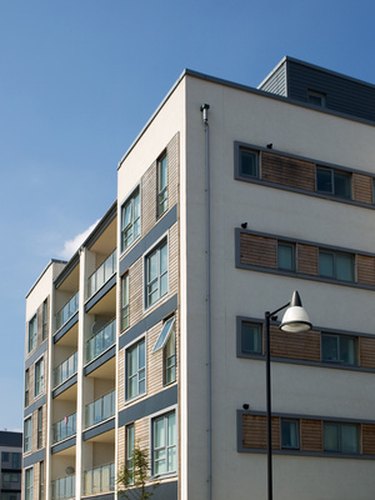Things You'll Need
Ladder
Sturdy shoes
Work gloves
Safety goggles
Broom
Hammer
Degreasing cleanser
Garden hose
Roof roller
Cold tar adhesive
Galvanized 2-inch roofing nails
Roofing membrane
Reflective roof coating

A cold tar roof is a method of applying tar to a flat roof that is cleaner, more environmentally friendly and easier to apply. The cold tar is painted onto the surface, and then pieces of roofing membrane are placed on the roof between the layers of tar to waterproof the roof. This is one of the easiest types of roofing to install, and it is possible to complete the project yourself in just a few days. When working on a roof, make sure to follow all safety procedures.
Step 1
Put on sturdy shoes, work gloves and safety goggles. Position a ladder, if needed, to access the roof. Clean the roof of all dirt, gravel and other debris with a broom. Clean the surface of the roof with a degreasing cleanser and a garden hose to prepare the roof for the tar application. Allow the roof to dry for a few hours after cleaning.
Video of the Day
Step 2
Hammer down any loose nails or pieces of flashing before installing the tar roof.
Step 3
Apply the roof coating when the outside temperature is above 65 degrees Fahrenheit and there is no danger of rain for at least 48 hours.
Step 4
Apply a coating of cold tar adhesive to the entire roof. Use 1.5 gallons of adhesive per 100 square feet of roof. Work from the farthest part of the roof back towards the ladder. Apply the roofing membrane in the opposite manner so that you never have to step on the tar.
Step 5
Place one layer of roofing membrane over the tar. Nail the membrane into place with the roofing nails. Place a nail every 9 inches along the edges of the membrane pieces.
Step 6
Roll the membrane with a clean roof roller three hours after applying the membrane.
Step 7
Repeat the process two more times for a total of three layers of roofing. Do not nail the second or third layers of membrane.
Step 8
Paint a reflective coating over the entire roof 48 hours after applying the last layer of cold tar roof. The coating helps with energy efficiency and also protects the tar from weathering.
Video of the Day